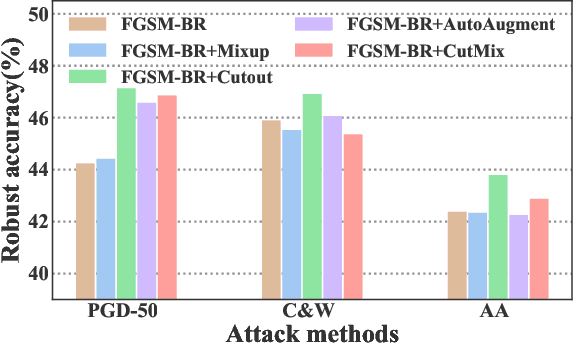Revisiting and Exploring Efficient Fast Adversarial Training via LAW: Lipschitz Regularization and Auto Weight Averaging
Paper and Code
Aug 22, 2023



Fast Adversarial Training (FAT) not only improves the model robustness but also reduces the training cost of standard adversarial training. However, fast adversarial training often suffers from Catastrophic Overfitting (CO), which results in poor robustness performance. Catastrophic Overfitting describes the phenomenon of a sudden and significant decrease in robust accuracy during the training of fast adversarial training. Many effective techniques have been developed to prevent Catastrophic Overfitting and improve the model robustness from different perspectives. However, these techniques adopt inconsistent training settings and require different training costs, i.e, training time and memory costs, leading to unfair comparisons. In this paper, we conduct a comprehensive study of over 10 fast adversarial training methods in terms of adversarial robustness and training costs. We revisit the effectiveness and efficiency of fast adversarial training techniques in preventing Catastrophic Overfitting from the perspective of model local nonlinearity and propose an effective Lipschitz regularization method for fast adversarial training. Furthermore, we explore the effect of data augmentation and weight averaging in fast adversarial training and propose a simple yet effective auto weight averaging method to improve robustness further. By assembling these techniques, we propose a FGSM-based fast adversarial training method equipped with Lipschitz regularization and Auto Weight averaging, abbreviated as FGSM-LAW. Experimental evaluations on four benchmark databases demonstrate the superiority of the proposed method over state-of-the-art fast adversarial training methods and the advanced standard adversarial training methods.
 Add to Chrome
Add to Chrome Add to Firefox
Add to Firefox Add to Edge
Add to Edge